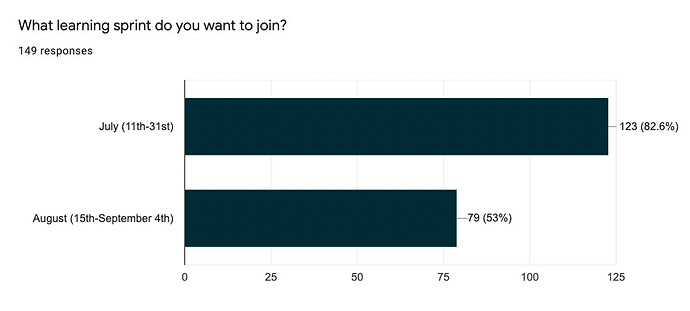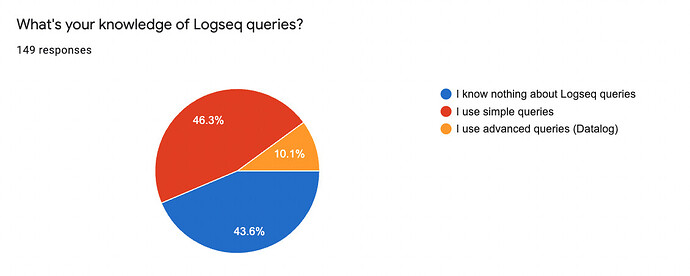Search your notes and build dynamic dashboards using Logseq’s query language. In this subforum you find resources to learn to write queries, and experts in case you get stuck.
Do you want to unlock your notes and grok how Logseq works? Then you should join the Query Learning Sprints this summer! This post tells you everything you need to know to kickstart your learning journey.
Table of Contents
- What is a learning sprint?
- Why a learning sprint about queries?
- What will the learning sprint look like?
- How to participate in the learning sprint?
- Who is joining the sprint?
What is a learning sprint?
The goal of a learning sprint is to learn with each other so that we can learn faster.
There’s no hand-holding, so we’ll have to learn through trial and error. But we won’t be completely alone as we’re sprinting together. We’ll share our resources, warn of pitfalls, and develop new ideas by communicating freely. That’s how experts are made.
In a learning sprint, we’re vocal about our goals to find others aiming for the same.
To reach our shared goal, we help each other make progress. If the going gets tough, we ask for help. If we see someone gets lost, we help them back on track. We learn by asking and by teaching.
Lucky for us, some experts in the Logseq community are further along the learning path than most of us (myself included). They share how they learned about the deeper parts of Logseq and how to harness its power. And they help us out when we’ve created something that’s not working as expected. Fellow Logseqers are our guides.
Why a learning sprint about queries?
Logseq is the perfect companion to learn new skills and store knowledge. But as your graph grows, finding things back can become challenging. Information overwhelm is creeping in again, which was why you started using Logseq in the first place.
Luckily, there is a powerful way to search through your pages and branches of helpful information. You only need to tell your graph a few magical words to uncover all of its secrets. You need queries.
Queries is a topic you hear a lot about in the Logseq community, but it also confuses the heck out of most people. You may have some clue that you need to learn how to use queries. But once you see something that looks like code, you back off. You don’t want to become a coder to use Logseq; you just want to find your notes back.
Luckily, you don’t need to be a programmer to understand Logseq queries; they’re fun and easy to learn.
What will the learning sprint look like?
Here’s the outline of what to expect. But remember: you shape this sprint, so things can go any way you want.
Week 1: Setting up — The principles of effective learning systems
- Why you should have a learning system.
- What you need for a learning system.
- How to find and manage resources.
- How to manage time.
- How to manage focus.
- How to take notes.
- How to make flashcards.
- How to challenge yourself.
- Project: A personal learning plan in which you’ve selected resources, decided on a note-taking approach, and blocked time to learn and build.
Week 2: Simple queries — Understanding Logseq’s outline logic and searching your graph
- What are query languages?
- Why you should indent and link in Logseq.
- The fundamentals of boolean logic.
- Query filters.
- Combined query filters.
- Project: Build a pipeline system using simple queries.
Week 3: Advanced queries — Understanding Datascript databases and starting with the Datalog query language
- How Logseq works under the hood.
- What you need to know about Datalog.
- The fundamentals of data patterns.
- How to customize tables using Hiccup.
- Project: Build a task management dashboard using advanced queries.
How to participate in the learning sprint?
Participating in the learning sprint won’t cost you a dime of money, but it will cost you.
We expect you to do the work and create something useful for yourself. We also hope you ask questions in this forum when you’re stuck, share resources and tips, and help by answering questions.
We’ll do our part by facilitating live Q&A sessions with power users and teachers from the Logseq community.
Because of overwhelming interest, there will be two learning sprints this summer. The first sprint is from July 11th until July 31st, and the second will be from August 15th until September 4th. Both sprints will be similar in setup, so feel free to join any of them (or both!).
When you decide to join, consider creating a new post in the #learning-sprints:queries category. In this post, keep a learn log with your notes. I’ll soon start my own learn log in the forum and link to it from this post.
Why keep a learn log? Not only will writing your notes in your own works help you to learn, sharing your notes will help others learn faster. It’s my hope this will keep the “learning flywheel” spin faster.
Who is joining the sprint?
Almost 200 people signed up for at least one learning sprint this summer, and many will join both! Some of you also filled in the signup form, which helps us to fine-tune this learning sprint.
When it comes to current knowledge, there’s a healthy mix of beginners, intermediate, and advanced users. Hopefully, some of the experts among you will freely share your notes and resources to make learning queries much easier.

